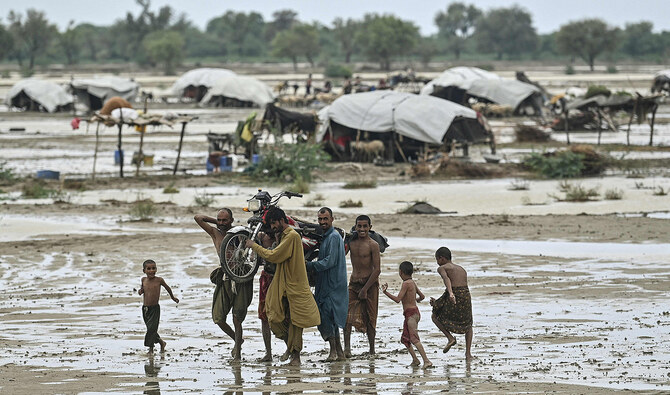ISLAMABAD: The Pakistan Meteorological Department (PMD) this week forecast torrential rains in many parts of the country till Aug. 29, warning they could trigger flash floods and landslides as the nationwide death toll from rain-related incidents since July surged to 243.
In a press release issued on Friday, the PMD said a low pressure located over west Bengal may approach southern parts of the country on Aug. 25 due to which strong monsoon currents are likely to enter the country, especially its southern parts, from Aug. 25.
“Pluvial flood/inundation may occur in low-lying areas of Sindh, Balochistan and southern Punjab,” the PMD said.
As per the latest situation report released by the National Disaster Management Authority (NDMA), 243 people have been killed while 447 have been injured in rain-related incidents across the country from Jul. 1-Aug. 24.
The PMD said it expects rain and thundershowers in Karachi, Hyderabad, Dadu, Thatta, Badin, Sajawal, Shahed Benazirabad, Jamshoro, Tando Allayar, Tando Muhammad Khan, Tharparkar, Nagarparkar, Mithi, Mirpur Khas, Umarkot, Matiari, Sanghar, Sukkur, Ghotki, Shikarpur, Kashmore, Khairpur, Larkana, Jacobabad and Nausheroferoze areas in Sindh from Aug. 25-29 with occasional gaps.
Meanwhile, it said rain and thundershowers are also expected to take place in Islamabad/Rawalpindi, Murree, Galliyat, Attock, Chakwal, Tala Gang, Jhelum, Mandi Bahauddin, Gujrat, Gujranwala, Hafizabad, Wazirabad, Sahiwal, Jhang, Toba Tek Singh, Nankana Sahib, Chiniot, Faisalabad, Lahore, Sheikhupura, Sialkot, Narowal and Okara areas of Punjab from Aug. 25-28.
From Aug. 26-30, it said rain and thundershowers are expected in Khuzdar, Kalat, Lasbella, Awaran, Naseerabad, Sibbi, Jaffarbad, Kohlu, Harnai, Dera Bugti, Zhob, Quetta, Ziarat, Sherani, Qila Abdullah, Qila Saifullah, Barkhan, Musa Khel, Loralai, Mastung, Bolan, Jhal Magsi, Kech, Panjgur, Gwadar, Jiwani, Pasni and Ormara in the southwestern Balochistan province.
The weather department said that rains and thundershowers were also expected to take place in Chitral, Dir, Swat, Kohistan, Malakand, Shangla, Battagram, Buner, Kohat, Bajaur, Mohmand, Khyber, Mansehra, Abbottabad, Haripur, Peshawar, Swabi, Nowshera, Mardan, Charsadda, Hangu, Kurram, Orakzai, Waziristan, Bannu, Lakki Marwat and Dera Ismail Khan areas of the northwestern Khyber Pakhtunkhwa province from Aug. 26-28.
Pakistan is recognized as one of the most vulnerable countries to climate change effects. This year, the South Asian country recorded its “wettest April since 1961,” with 59.3 millimeters of rainfall while some areas of the country faced a severe heat wave in May and June.
In 2022, unusually heavy rains triggered flash floods in many parts of Pakistan, killing over 1,700 people, inflicting losses of around $30 billion, and affecting at least 30 million people. Scientists have attributed Pakistan’s erratic weather patterns to climate change effects and called on countries around the world to take urgent steps to tackle the crisis.
















